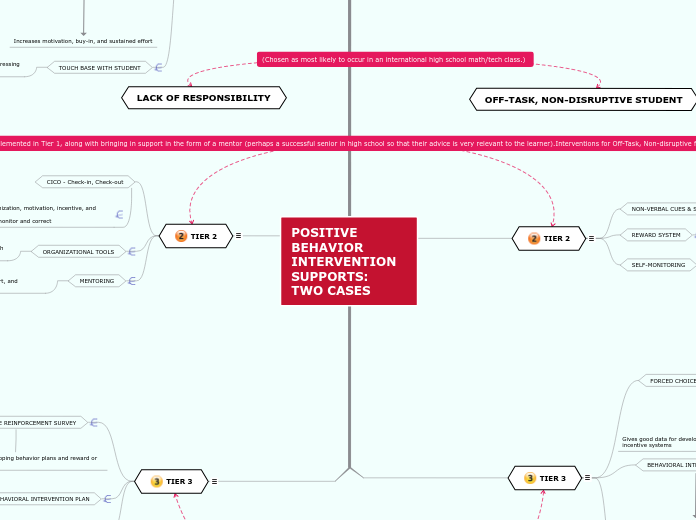da vamshi mugatha mancano 6 anni
414
Positive Behavior Intervention Support - Vamshi Mugatha
Special Education Referral Process

da vamshi mugatha mancano 6 anni
414

Più simili a questo
Data Tracking -Tier 1
For students: Self-monitoring assignment sheet or if some behaviors, organization and assignments need to be monitored, then a tracking form could be created specifically for the individual. It's important that the tracking be largely student monitored since the age group is high school, and independence is an important theme for students at this stage.
For teachers: Tier 1 Intervention General Tracking form would provide the documentation of interventions attempted over time.
Data Tracking -Tier 3
For students: Student Progress Self-Evaluation and/or Self-Assessments could be given if they have not already been administered in Tier 2. Providing students with a self-referral form to the counselor would also be a good idea; high school students want to feel like they have choices. In line with that, the Forced Choice Survey should be administered to students during Tier 3 as well.
For teachers: At this point, it would be time to call in the School Counselor and/or the Behavior Intervention Specialists through the use of the referral forms for the school/district. Teachers could use information gathered from Scatter Plots and other data tracking in Tiers 1-2 to complete a Functional Behavior Assessment. Teacher would also want to continue tracking the progression of interventions and results from Tier 1 to Tier 2 to Tier 3 on an online platform or electronic form such as PBISWorld Behavior and Intervention Tracking form. If the school has the Google Suite, a shared tracking form could be created to document interventions being implemented by all teachers who work with that student.
Data Tracking -Tier 2
For students: Daily (if necessary) or weekly Check In, Check Out forms for the student would serve as self-monitoring (given the ages of those in high schools classes). After some time, Student Progress Self-Evaluation and/or Self-Monitoring Assignment sheets could be given, which would hopefully help address the issue of responsibility.
For teachers: Check In, Check Out Data Summary forms would help the teacher compile and track the student's performance over time on the CICO intervention. Teacher would also want to continue tracking the progression of interventions and results from Tier 1 to Tier 2 on an online platform or electronic form such as PBISWorld Behavior and Intervention Tracking form. If the school has the Google Suite, a shared tracking form could be created to document interventions being implemented by all teachers who work with that student.
Data Tracking -Tier 1
For students: A self-monitoring behavior sheet could be created specifically for the student to help them become more self-aware. It's important that the tracking either be largely student monitored or subtly monitored by the teacher, since the age group is high school, and independence is an important theme for students at this stage.
For teachers: Tier 1 Intervention General Tracking form or an online platform like LiveSchool would provide the easy yet unobtrusive documentation of interventions attempted over time.